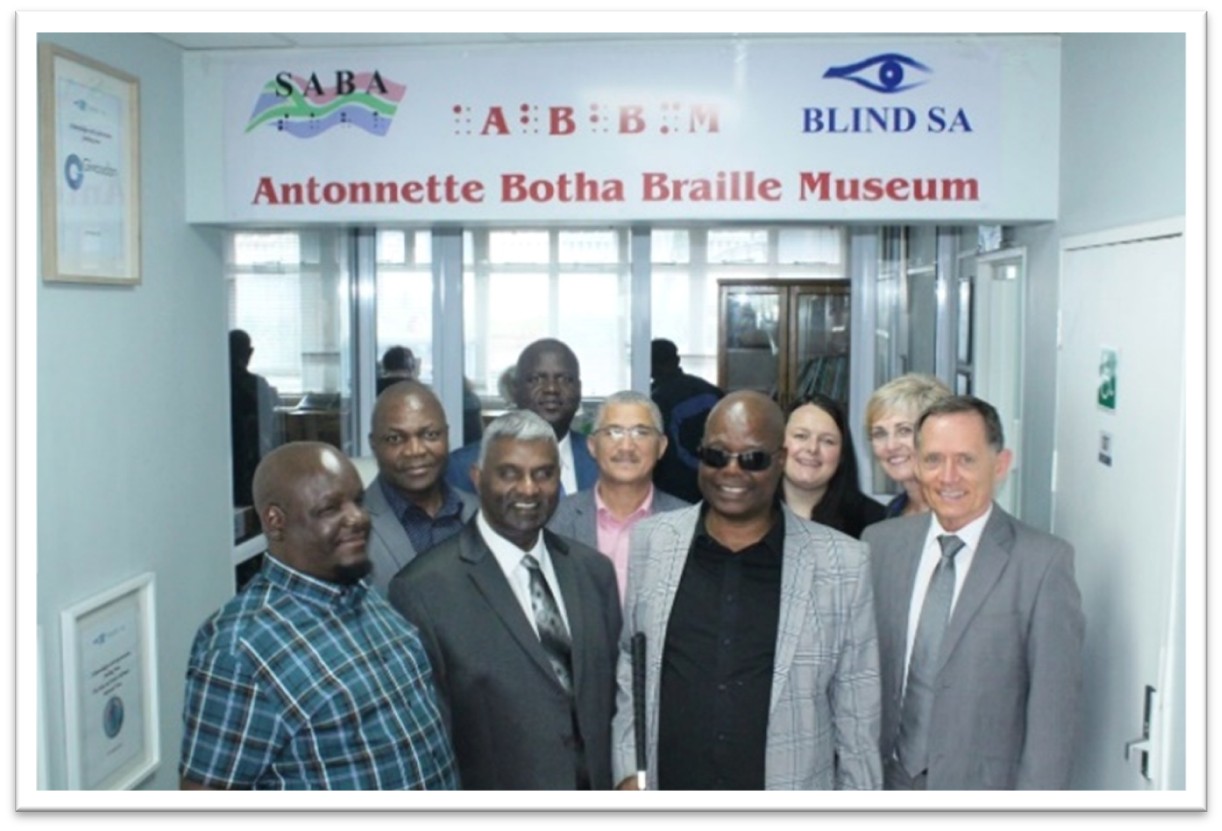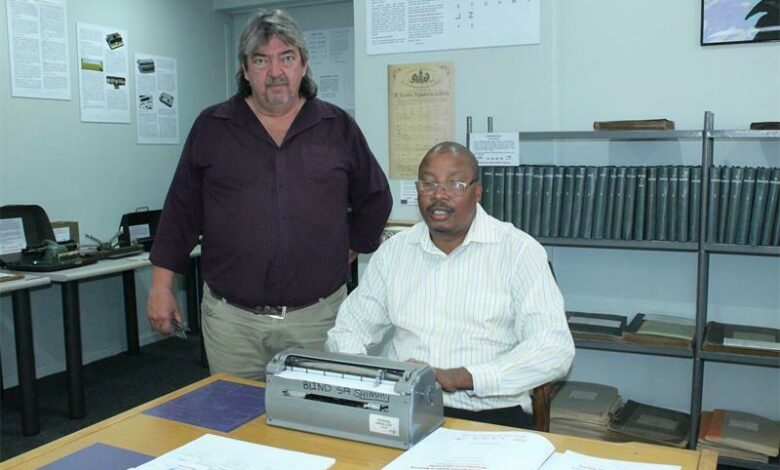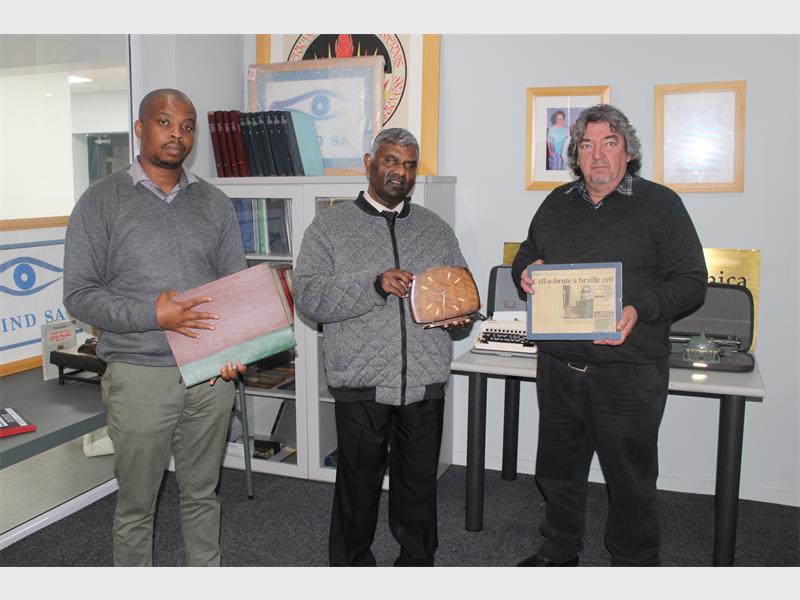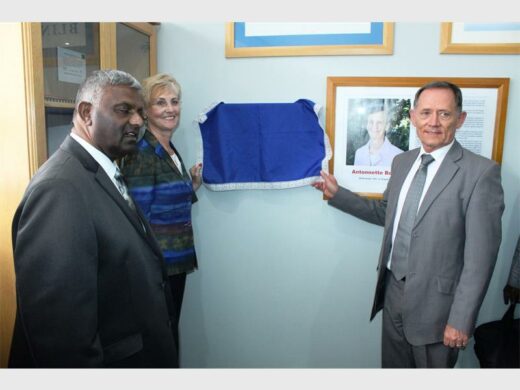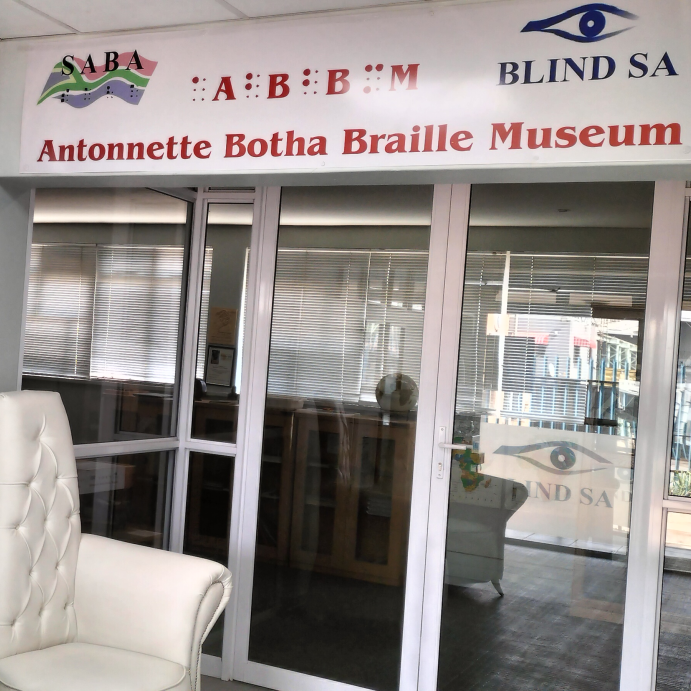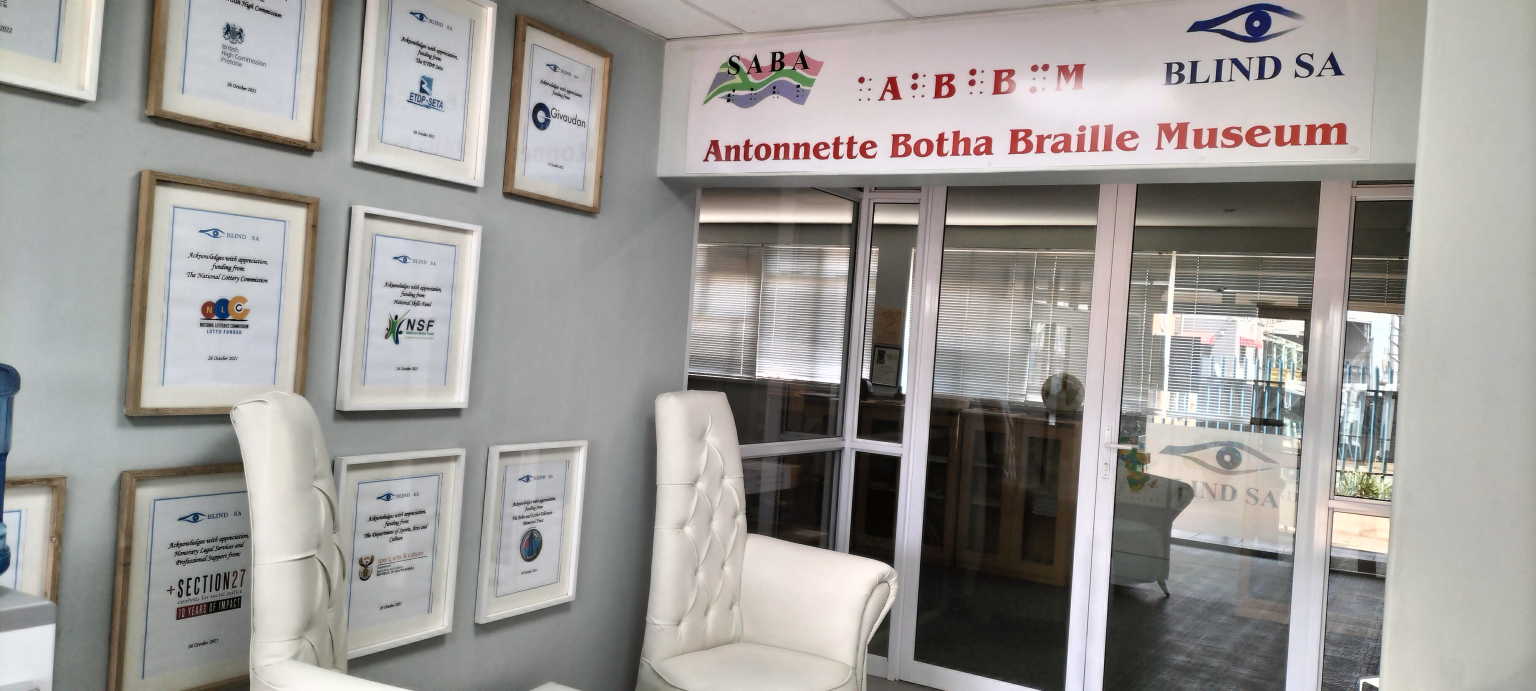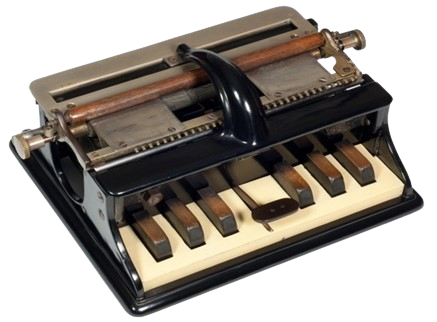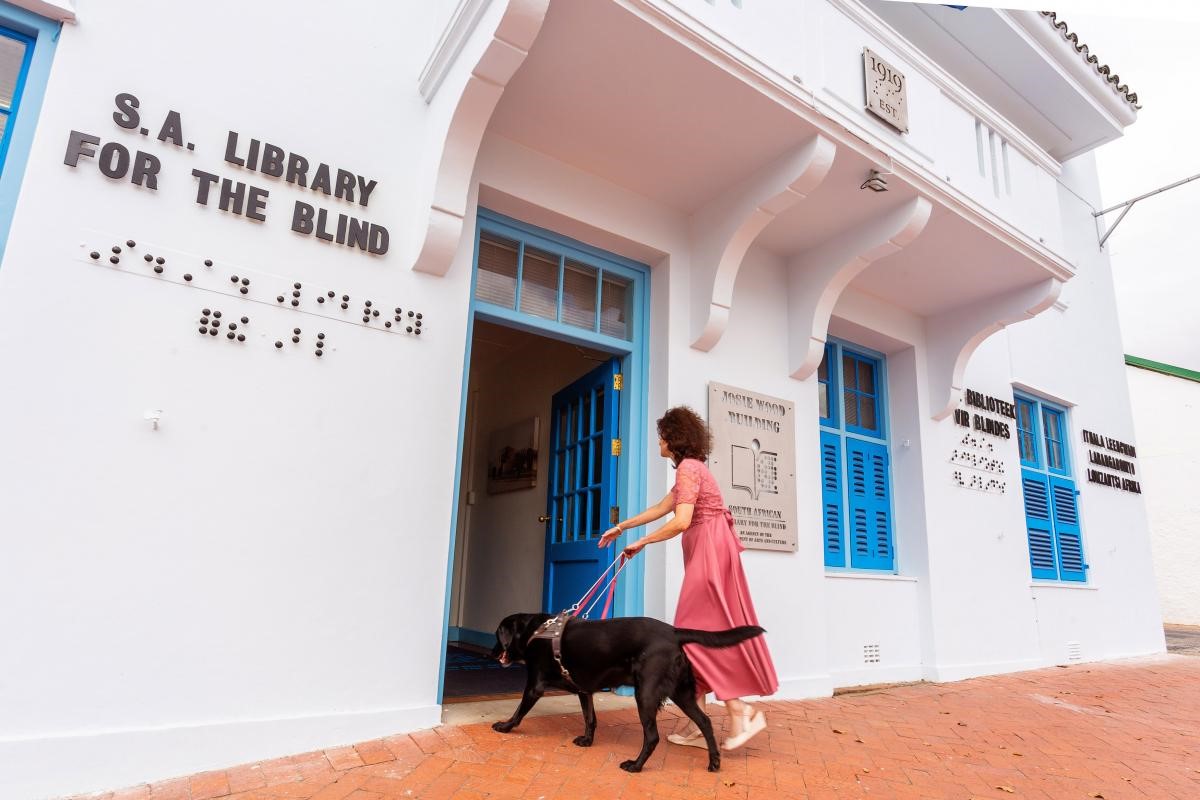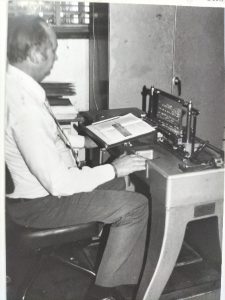
About Us
Vision
Our vision is a world where braille is universally valued, fostering inclusivity and independence.
Mission
Our mission is to preserve and promote braille, empowering visually impaired individuals.
Values
Explore what inspired the ABBM:
Antonnette Botha:
A Braille Pioneer
Early Years and Education (1930s – 1950s)
After matriculating at the School for the Blind in Worcester (now known as the Pioneer School) she took a course in English braille shorthand, and later went on to develop an Afrikaans code for braille snelskrif.
Thereafter she attended the University of Stellenbosch where she obtained a Diploma in Music.
Leadership in Braille Advocacy (1990 – 2007)
After completion of her studies, she was appointed as a music teacher at the School for the Blind in 1957 where she worked until her retirement in 1996.
During her employment at the school she taught music, as well as braille shorthand and snelskrif. From 1983 until 1989 she was head of the Braille Music Library at the school. In 1993 she became Head of Department for braille.
But the role she played in the field of braille went far beyond her position as teacher at the School for the Blind.
Recognition and Legacy (1990 – 2014)
In 1991 she became a member of the then braille authority, Braille SA, of which she became the chairperson from 1995 until 2007. In this forum she played a leading role in the development and improvement of South African braille codes.
Since 1992 until 2014 she served on several committees of the International Council on English Braille (ICEB). At this level she played a leading role in the development of a new braille code, the UBC, driving the project in South Africa through the various stages of awareness, user consultation, and promotion, until its adoption by Braille SA in 2004. This code has now been implemented in all 8 member countries of ICEB. To facilitate the transition from the old pre-unified braille code to the new unified code, Antonnette developed excellent training material, which has been widely used since 2007. She has conducted numerous braille training courses for braille users and producers.
In recognition of her sterling work in the field of braille, Antonnette was awarded the Blind SA Medal of Honour in 1990 and in 2013 she received another award and citation from Blind SA. In 1997 she was honoured by being made a fellow of the Braille Research Center in Baltimore, USA.
It must be mentioned that all the braille-related work Antonnette did outside of her employment at the school, she did in her own free time as a volunteer and she did not receive any remuneration for it. Thousands of braille users in South Africa and internationally and readers of all 11 our official languages have benefited greatly from Antonnette’s work and will continue to benefit from it for years to come.
Honoring a Legacy (2014)
In acknowledging the contributions made by Antonnette and in recognition of her meritorious and distinguished services in empowering blind and partially sighted people, SABA and Blind SA decided to name this museum the Antonnette Botha Braille Museum.
Antonnette Botha GalleryExplore some of her lectures:
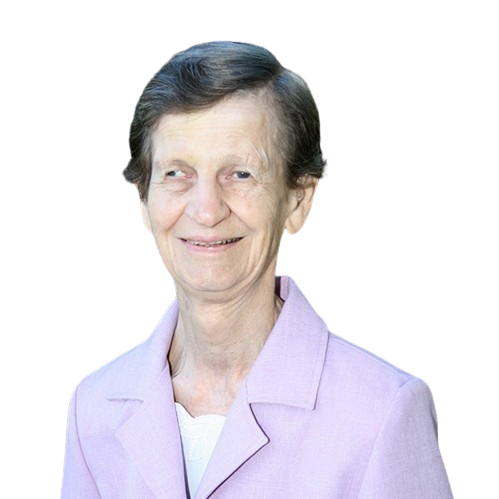
More tributes and readings:
Antonnette Botha Braille Museum
It is with great pleasure, privilege and humbleness that I welcome you to our journey of preserving the rich heritage of braille. Established through a partnership between Blind SA and the SA Braille Authority (SABA), the ABBM embodies a commitment to braille preservation and advocacy. Established through a partnership between Blind SA and the SA Braille Authority (SABA), the ABBM embodies a commitment to braille preservation and advocacy.
July 18, 2022
Inaugural meeting of the ABBM marks the beginning of its establishment process.
August 25, 2022
Memorandum of Understanding signed by Blind SA and SABA, laying the foundation for the ABBM.
September 5, 2022
Formal election of the ABBM Board, comprising dedicated individuals committed to braille preservation.
November 16, 2022
Adoption of ABBM constitution during the first Quadrennial General Meeting, solidifying its organizational structure.
November 29, 2022
Official opening of the Museum at Blind SA House, marking a significant milestone in braille advocacy.
The Inaugural Board
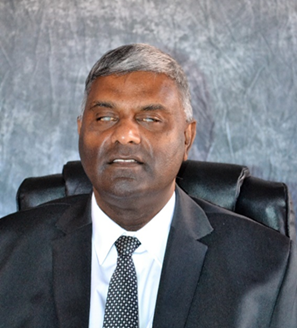
Jace Nair
Chairperson
Blind SA
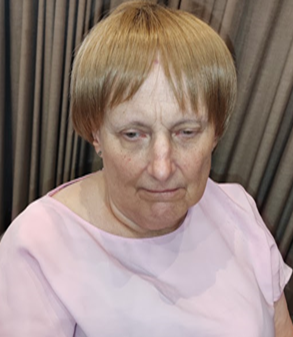
Susan Bam
Vice Chairperson
Blind SA (Vice Chairperson)
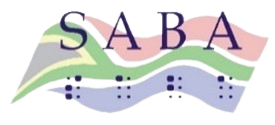
Neels Matthyser
Treasurer
SABA (Treasurer)
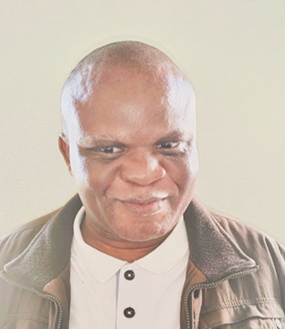
Eric Garna
Blind SA

Pasha Alden
SABA

Shani Little
SABA
With a focus on preserving braille and promoting its universal importance, the ABBM invites visitors from South Africa and around the world to explore our exhibits and join us in celebrating the enduring legacy of braille. Together, let us continue to advocate for braille literacy and empower visually impaired individuals worldwide.
We invite visitors from South Africa and from across the world to visit the Museum located at Blind SA House in Gauteng.

BLIND SA
EXECUTIVE SUMMARY
by President Ntshavheni Netshituni
From its inception in 1946, Blind SA has proven to be a well-modelled and resilient Organisation. Its growth has proven worth it to the blind community in South Africa. Of great importance, it introspected and elevated itself from the mirky apartheid past, and modelled itself as a democratic Organisation almost two years before the dawn of democracy. It is an Organisation that embraced living in the realm of realism, thereby playing an integral role in shaping the positive and beneficial future for the blind community in South Africa. As highlighted in its rich history, Blind SA had led in change for the past 76 years. I believe this is the role it will never abandon!
1946
Establishment of SABWO
1953
Braille Transcription Bureau, now Braille Services, was established
1972
Employment Committee established, and became the Economic Empowerment Committee in 2020
1975
Social Work services were introduced
1978
Information Exchange established, and became the Advocacy & Information Committee
1988
Skills Development Services introduced
1992
Constitution changed to make it a non-racial organisation
1992
Successfully lobbied for a secret vote for blind persons in the National Elections
1994
Charter of Rights produced for the Visually Disabled
1996
Braille version of the South African Constitution produced
2004
SABWO renamed to Blind SA
2006
Braille Training initiated
2010
Orientation & Mobility Services initiated
2017
First DAISY Audio book published
2020
Blind SA Bookshare Library established
2021
Blind SA House in Alrode established
2022
Training Centre in Parktown established

SA BRAILLE AUTHORITY
– A SHORT HISTORY
1980
Connie Aucamp participates in ICCOELB, sparking the idea of establishing a Braille authority in South Africa.
1986
February: Dr. William Rowland visits Worcester and, along with Connie, invites Christo de Klerk to discuss establishing the authority.
The authority is formed under the South African National Council for the Blind as a “partnership committee.”
1990
Connie Aucamp steps down as chairperson of the authority towards the end of the decade.
1991
Braille SA begins participating in ICEB, with Connie becoming its first president.
2004
The Unified English Braille code (UEB) is adopted at the ICEB General Assembly in Toronto, Canada.
2007
Christo de Klerk is elected chairperson of Braille SA.
Roll-out of UEB in South Africa begins.
2012
May 3: The South African Braille Authority (SABA) is established in Midrand, with Christo de Klerk as its first president.
ICEB General Assembly hosted by SABA, SANCB, and Blind SA.
2015
Authority shifts to holding one General Assembly annually as a cost-saving measure.
Present
Continued advocacy efforts for Braille recognition by SABA.
Hosting of ICEB meetings by Braille SA and SABA.
SABA holds copyrights for educational resources like “Hands-on” and LibLouis braille translation tables.
Her participation there brought her on the idea of establishing a braille authority in South Africa. She discussed it with Dr William Rowland, who was then the National Executive Director of the South African National Council for the Blind.
William visited Worcester in February 1986 and he and Connie invited Christo de Klerk to a meeting at Connie’s home to discuss this. At the time, Christo also worked at the Pioneer School and lived in Worcester. They decided to establish the authority under the auspices of the South African National Council for the Blind as, what was then known as a “partnership committee”.
The South African Library for the Blind and Blind SA (then the SA Blind Workers Organisation, SABWO) were approached and the idea was put to them and the authority was established which consisted of the four partners. Initially it was called “Die Suid-Afrikaanse Braille Komitee/The South African Braille Committee”, but its name was soon changed to Braille SA. Connie was its first chairperson.
Towards the end of the 1990s Connie Aucamp stepped down and Antonnette Botha was elected as chairperson. In 2007 she stepped down and Christo de Klerk was elected as chairperson until 2012 when Braille SA was dissolved and the South African Braille Authority was established.
Through the years of Braille SA’s existence varying numbers of schools participated. Membership was a loose and informal business, but the four partners continued as the core of Braille SA.
In 1991 Braille SA started participating in the newly established International Council on English Braille (ICEB) of which Connie became its first president. The main project was the development of the Unified English Braille code (UEB), originally called the Unified Braille Code (UBC). The new code was adopted at the ICEB General Assembly in Toronto Canada in 2004 and a month or two later by Braille SA for South Africa. Its roll-out here began in 2007, but many awareness projects had been conducted locally during the preceding decade.
On 3 May 2012 the South African Braille Authority (SABA) was established in Midrand, South Africa. Christo de Klerk was elected as its first president. After one term of office, Ntshavheni Netshituni was elected president.
Since the establishment of Braille SA until about 2015, the authority used to meet twice annually, but then as a cost saving measure it was decided to have just one General Assembly annually.
Braille SA struggled to get recognition from Government and so did SABA initially, although that seems to have been improving more recently.
A number of meetings with the Department of Arts and Culture, the Department of Basic Education and various other entities were held to further the cause of braille in South Africa and more specifically to recognise the authority on braille in South Africa. There was also fierce resistance from the Department of Education during the early stage of adopting the Unified Braille Code.
Braille SA hosted the ICEB midterm meetings of 1997 in Pretoria and 2007 in Worcester and SABA together with the SANCB and Blind SA hosted the ICEB General Assembly in 2012 immediately following SABA’s founding meeting.
SABA is the copyright holder of Hands-on, a braille learning/teaching manual written for SABA by Reinette Popplestone and published in 2012. SABA is also the copyright holder of the LibLouis braille translation tables for Afrikaans, isiXhosa, isiZulu, Sepedi, Sesotho, Setswana and Tshivenda, which was developed and is maintained by Christo de Klerk.
Cathy Donaldson
President of Blind SA from 2004 to 2020
Remembering Cathy Donaldson
A Legacy of Leadership, Advocacy, and Inspiration for the Blind Community
It is with a sad heart that we bid farewell to Cathy Donaldson, Past President of Blind SA. Her presence will be sorely missed.
Cathy Donaldson was born blind. She attended a mainstream school up until the age of 14½ years, after which she attended the School for the Blind in Worcester. She learned English and Afrikaans Braille in 6 months.
She matriculated in 1961 with a first-class pass. Afterward, she returned to the School to be trained as a telephonist. On completion, she was employed by the Westonaria Town Council where she worked for 40 years.
Cathy was involved in many activities as a member of various committees and in sports and she excelled in all these activities as follows:
- Member of the South African Braille Authority since its inception
- Secretary of the Legal and Constitution Committee of SABA
- Member of the Advocacy Committee of SABA
- Member of the World Braille Council
- President of Blind SA (4 terms of office)
- Member of Blind SA’s Executive Committee
- Member of Blind SA’s General Assembly
- Ex-officio member of all Committees of Blind SA
- Member of the SABWO Trust
- Chairperson of Egoli Blind Member Organisation: Blind SA
- Deputy-Chairperson of the South African National Council for the Blind
- Member of the National Executive Committee of the South African National Council for the Blind
- Member of the Legal and Constitution Committee of the SANCB
- Chairperson of the Education Committee of the SANCB
- Member of SADA for SANCB
- Vice-President of the African Union of the Blind (AFUB)
- Chairperson of the Women’s Forum of the African Union for the Blind (AFUB)
- Chairperson of the WBU Women’s Committee
- Past Secretariat of the Southern African Region of the African Union for the Blind
- Executive Committee member of ICEVI Africa
- Trustee of Johannesburg School for the Blind (Children of Fire)
- Trustee of the Board of NOBSA
- Member of the Trustee’s Board of the Body Corporate of Libra Lodge
- Member of SA Library for the Blind
- Member of Tape Aids for the Blind
- President of NABB (National Association for Blind Bowlers) for many years.
- President of IBBA (International Blind Bowls Association)
- Honorary Life President – Blind SA Since October 2020
Cathy’s dynamic character was already evident in her youth. Although she was totally blind, she attended a school for sighted children. She kept up with her class – except that she was not taught to read and write.
Braille was a very important part of her life and she always promoted braille wherever she could.
She received the Melvin Jones Award for Outstanding Service and the Lifetime Achiever Award from the Most Influential Women in Business and Government (MIV) in 2009.
She was also a finalist in 2015 for the Most Influential Women in Business and Government (MIV) 2015/2016 Awards.
On the sports front, Cathy was a Protea Lawn Bowls player, who represented South Africa in her capacity as a player, and as the Team Manager for numerous International Tournaments.
Cathy’s legacy will live on in our hearts. Our sincere condolences to her remaining brother and his family, and all those whose lives she touched.
Funeral and Memorial Service arrangements have not been confirmed yet, but Blind SA will circulate the announcement once it is finalised.
Jace Nair
CEO – Blind SA
You can make a difference!
By donating to the museums cause you can make a difference in the preservation of Braille’s History.

